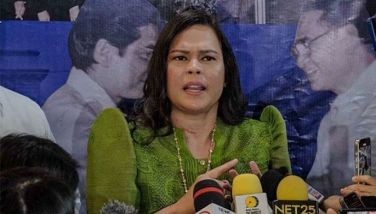Celebrating a relationship

EVERETT – These are bonds that one Philippine president will find tough to break:
Last Friday in this city in Washington state, Philippine Airlines, through its president Jaime Bautista, took possession of a Boeing 777-300ER – the first of two to be acquired by PAL this year and the seventh in its fleet of 79.
The new plane will have its maiden commercial flight this week, to Vancouver.
I’m filing this article while waiting to board the Manila-bound flight of the 777-300ER from Boeing’s Everett plant – the largest aircraft manufacturing complex in the world, a mini city with its own runway, with 40,000 employees working around the clock in three shifts, sprawled across 500 hectares in the American northwest.
In this facility, which opened in 1967, the first Boeing 747 “jumbo jet” – called the “Queen of the Skies” – was built in 1968. Since then Boeing has produced some 1,500 of the planes while developing even better commercial aircraft for various requirements.
Boeing’s regional director for product marketing Jeffrey Haber said the 777-300ER is two percent more fuel efficient than previous models. Two percent is a big deal in aviation; it translates into an additional 150 nautical miles for the aircraft. The aircraft can seat up to 396 passengers (Bautista told me they would carry 370) while the cargo hold can accommodate, Haber said, more than 1,200 standard Pinoy balikbayan boxes. Boeing knows its customers. Particularly PAL, Asia’s first airline, which this year is celebrating its 75th anniversary at the same time that Boeing is marking its centennial.
“This shows the great history that we have together,” Haber told Filipino visitors. “We have so many things to celebrate.”
* * *
The B-777 series is a long way from Boeing’s first aircraft, the 74-seater Clipper. In 1946, the company rolled out the DC-3 with five domestic routes in the US. Two years later, the DC-6 made the world’s first trans-Pacific flight. It took a grueling 41 hours, with stops in Honolulu, Wake Island and Guam. In 1962, the DC-8 launched the age of international travel. Boeing began aiming for better passenger comfort; in 1980, the 747-200 featured the first “skybeds.”
Our non-stop flight to Manila on the B-777-300ER will take over 13 hours. PAL acquired the aircraft through a lease arrangement with private lessor Intrepid Aviation. Bautista told me that the lease price is $250 million, but the actual amount is confidential.
While waiting for our flight, a team from Taiwan’s Eva Air also took possession of another 777 series aircraft and took off. Based on sales, Haber said Boeing’s “triple 7” series is “the most preferred twin-aisle plane of all time.”
The Everett plant produces about 100 jets every year. The new generation Dreamliner, the 787X, is scheduled for rollout in 2020. It uses composites rather than aluminum for the body, making it 20 percent more fuel-efficient and allowing for larger windows, with no need for shades; simply push a button and the window goes dark.
This is apart from the 100 percent lie-flat seats on first and business class, LED lighting and the use of soothing colors for the interior (blue is preferred for the ceiling to simulate the sky).
Over 60 airline companies have ordered 777 series planes, with Japan’s ANA the biggest buyer. Since acquiring its first 777 in September 2011, ANA has bought over 50 more, with another 70 on order.
While touring the plant earlier in the day, we saw Boeing’s 1,456th aircraft in production, for Emirates.
* * *
“It’s more fun to fly Boeing,” Haber said in a play on the Philippine tourism marketing slogan, which we told him the Duterte administration would be replacing soon.
Like most things in this world except the myopic mindset of certain Philippine officials, aircraft manufacturing is a globalized undertaking. European manufacturer Airbus, Boeing’s rival, is multinational. The 777-300 series is no different. Its wing is made in Japan and its midbody in Japan and Italy. A Boeing plant in South Carolina builds the aft body while the forward body is made in Wichita, Kansas. Other materials and parts, such as lavatories and engines, are sourced from all over the world.
Fortunately, while Du30 is grabbing worldwide attention for all the wrong reasons, Americans have enough problems with their upcoming elections to pay attention to anti-US rhetoric from Philippine officials.
And while our President wants to “separate” from Uncle Sam and pivot to Beijing, Boeing, a quintessential American company, is doing great business with China, aside from employing Chinese (and Filipinos). Boeing’s first engineer was a Chinese immigrant, Wong Tsoo. Its biggest buyers, I’ve been told, are Chinese companies, with demand still growing, followed by Middle Eastern carriers.
Washington state is also home to global brands that Filipinos aren’t going to dump just because the President doesn’t like Uncle Sam. It’s the home base of Amazon and Microsoft; Bill and Melinda Gates live on a lakeside home in Redmond. Starbucks started out in a small place at Pike’s Place Market in Seattle; the café is now a landmark. When I dropped by Thursday the place was packed with tourists. And of course the city is home to Seattle’s Best coffee. But Washington state’s biggest employer is Boeing.
At any given moment, we were told, an average of over 5,000 commercial aircraft are airborne all over the planet. The planes are mainly Boeing, still the market leader, or Airbus.
Boeing’s strategy, according to Jim Prouxl who’s in charge of corporate brand marketing, “is to make the customer fall in love” with the aircraft.
“Airplanes are really, really long-term assets,” Prouxl said. “This is about a marriage… a really long-term relationship.”
Ties between the Philippine flag carrier and this American company aren’t headed for any separation.
- Latest
- Trending

























